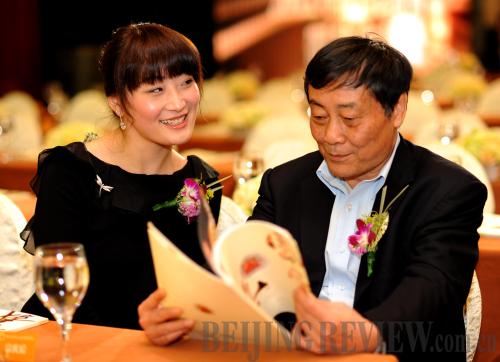|
 |
|
FATHER AND DAUGHTER: Zong Qinghou, Chairman of Wahaha Group, attends the Zhejiang Entrepreneurs Awarding Ceremony with his daughter Zong Fuli on January 12 (IC) |
Zong Fuli, also born in 1982, has a lot in common with Zuo Ying. As the only child of Zong Qinghou, China's richest man in 2010 and the chairman of beverage giant Wahaha Group, Zong Fuli spent several years in the United States receiving her high school and university education before joining her father's company in 2005 as an assistant to a mid-level manager.
When she first joined the company, she had difficulties in communicating with some of the staff at Wahaha. "I tend to use the straight-forward business methods of the West, but it is more common in Chinese culture to be less direct," she said.
She also had different ideas on how the company should be run. "If I ask employees what is the spirit of Wahaha, many people would reply my father's name Zong Qinghou," she said. "It is not the style of a modern company, which should focus more on the name of the brand, not the founder."
Zong Fuli focuses on expanding the overseas market as she feels her generation and her father's generations have "different missions."
"I want to do something to improve the image of China's food as recent scandals have affected the country's reputation internationally," she said. She is now in charge of about one third of the company's production capacity as well as the import and export arm. "Basically, my father takes care of operations for the domestic market and I run the international part," said the daughter. She developed an iced tea drink specifically for export.
The father and daughter also have different management styles. Zong Qinghou tends to give orders for people to execute, while Zong Fuli prefers employees to have their own ideas and their own sense of commitment.
In 2011, Wahaha had a total revenue of 67.8 billion yuan ($10.8 billion), making it one of the largest food and beverage companies in the world. Zong Fuli, as the apparent successor, usually keeps a low profile and seldom appears in the media.
"I think anyone who wants to pass a business on to the next generation or implement a change should first look at what is the desired direction of the business and then decide who should be the one to take over," she said. "I definitely don't want to take over the work just because I am his daughter."
 |
|
PASSING ON: Mao Zhongqun talks about his experience of taking over his father's position during a TV interview in Shanghai on January 17, 2008 (CFP) |
Given a strong sense of family ties in China in almost every private company, the founder's children are the first in line to take over from their parents. The children of these business people, however, generally don't regard taking over the company as their first choice.
Shanghai Jiaotong University Professor Yu Mingyang conducted a survey in 2011 on 182 large private companies in China. The founders of all the companies were in their 50s or 60s. In the next decade all these businesses will have to transfer leadership. The results of the survey showed that 82 percent of the founders' children didn't want to take over.
"Most of the children got degrees in foreign countries and have wider views. Compared with their parents, they don't have the experience of starting a company from scratch. Even when they decided to take over the business, they start from being the vice chairman or somebody in charge and not suffering a lot like their parents did," said Yu.
"Just because we didn't suffer that much doesn't mean we are worse at business," said Zuo Ying, who has proved to be a talented investor, she pocketed enough money from real estate investments to pay her own tuition while she was in college. She began purchasing stocks in the United States in 2007, and dumped all of them just before the financial crisis. In 2009, she snapped up shares of large firms, including Apple Inc., at bargain prices.
"I think the overseas experience has offered us some advantages that the first generation did not have," said Zong Fuli. "We have more international views and rely more on information technology."
| 